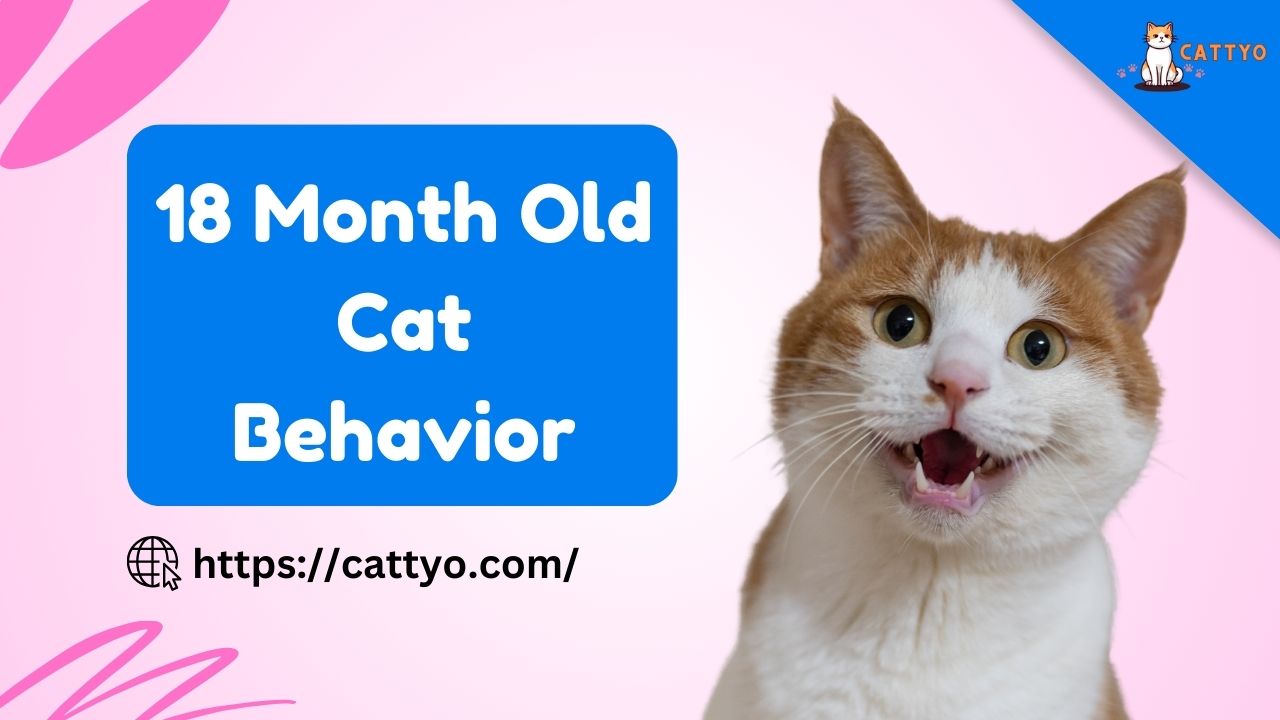At 18 months, your cat is blossoming into adulthood, displaying unique behaviors that reveal their true personality and instincts. Discover what drives their playful antics, independence, and affectionate moments during this pivotal stage.
So, your cat is 18 months old now. Congrats! Your fur baby has officially entered what could be called the “teenage years” of feline life. This is a stage full of surprises, mood swings, and the occasional rebellious streak.
But don’t worry, you’re not alone in this journey. Many cat owners have seen their perfectly sweet kittens transform into independent, sometimes aloof creatures around this age.
But what exactly is going on in your 18-month-old cat’s mind? Let’s dive in and explore!
18-Month-Old Cat Behavior
At 18 months, your cat is transitioning into full adulthood, exhibiting a blend of playful energy, increased independence, and nuanced affectionate behaviors. Understanding these developmental changes is essential for addressing their needs, fostering a strong bond, and ensuring their well-being.
- Transition to Adulthood: Your cat is moving past adolescence, displaying more mature and stable behaviors as they settle into their adult personality.
- Increased Independence: Expect your cat to enjoy more alone time, showing self-sufficiency while still valuing your companionship during interactive moments.
- Playfulness Continues: Active play remains crucial for physical exercise and mental stimulation, helping to prevent boredom and encourage healthy activity levels.
- Territorial Behavior: Your cat may become more protective of their space, marking territory and showing sensitivity to changes in their environment or the introduction of new pets.
- Affectionate Interactions: Displays of love become more refined, including purring, cuddling on their terms, and seeking attention in subtle ways.
- Exploratory Tendencies: Enhanced curiosity leads your cat to explore new areas and objects, necessitating a safe and enriched home environment to satisfy their inquisitive nature.
- Responsive to Training: At this age, cats are more capable of learning and responding to commands or training cues, making behavioral training more effective and rewarding.
- Health and Nutrition: Ongoing attention to diet and regular health check-ups are vital to support their continued growth, energy levels, and overall health.
- Socialization Needs: Maintaining positive interactions with both humans and other pets is important for emotional well-being and reinforcing good behavior patterns.
- Behavioral Adjustments: Addressing any unwanted behaviors early with consistent training and environmental management ensures a harmonious household and promotes desirable habits.
What’s Happening at 18 Months?
At 18 months old, your cat is reaching the peak of young adulthood. While they might still have some playful kitten energy, they’re starting to mature into their “grown-up” selves.
This age is a transition, where their behavior can range from quirky to unpredictable. Some cats will continue to act like kittens for a little longer, while others might seem to skip the ‘teenage phase’ altogether and become more serious (yes, serious—imagine that).
If your cat has been calm and cuddly as a kitten, you might notice some changes now. Suddenly, your lap isn’t always their favorite place to be.
Your once snuggly cat might start to seek more independence, as if they’ve decided that being on their own is, well, just better. You might even catch them sitting on the windowsill, gazing out at the world, as if pondering life’s bigger questions.
Common 18-Month-Old Cat Behaviors
- Increased Independence Do you ever feel like your cat has developed a “don’t bother me” attitude? It’s not personal, promise. At 18 months, your cat is becoming more independent and less reliant on you for constant attention. They might spend more time alone, but that doesn’t mean they love you any less. They’re just becoming their own little beings.Real-life scenario: You’re working from home, and your cat used to nap beside you all day. Now, they prefer to lounge in another room, giving you side-eye whenever you try to invite them to cuddle. It stings a little, doesn’t it?
- Increased Energy and Playfulness You know that moment when your cat goes zooming around the house for no apparent reason? That “zoomie” phase is alive and well in 18-month-olds. It’s like they’ve suddenly gained access to an unlimited supply of energy. But here’s the kicker: they may act like they’re toddlers on a sugar rush one minute, then collapse into a deep sleep the next.Example: Your cat might chase a toy mouse at full speed, leap from the couch to the windowsill like a tiny gymnast, and then curl up on the floor as if nothing happened. This unpredictable behavior can be entertaining, but it’s also a sign that they’re testing their physical limits and refining their hunting instincts.
- More Vocalization Cats are notorious for being selective talkers, but at 18 months, you may notice an uptick in your cat’s vocalization. Whether it’s demanding attention, voicing frustration, or just chatting with the air, they’re definitely getting their point across.Hypothetical situation: You’re lying in bed at 3 a.m., trying to get some sleep, and suddenly you’re awakened by your cat’s insistent “meow” from across the room. Maybe they’re trying to tell you something important… or maybe they just want to remind you that they exist.
- Territorial Behavior Around this age, your cat might start displaying more territorial behavior, especially if there are other pets around. Expect some hissing or growling if your 18-month-old is feeling possessive of their favorite spots or toys. It’s not always aggression; sometimes it’s just a cat asserting their right to their personal space.Example: If you have another cat, there might be some “discussions” about who gets to sit by the window, or who claims the best sunbeam.
- Increased Curiosity (and Mischief!) If you’ve ever come home to find your cat has knocked something off a shelf or chewed on your favorite pair of shoes, you know that 18-month-old cats can be a little too curious for their own good. They’re learning more about their environment, which sometimes leads to mischief.Personal anecdote: I had a cat once who decided that the plants on the windowsill were not just for decoration—they were for exploring. After knocking over a few potted plants, I found myself constantly checking to see which one was next on the hit list.
How to Handle Your 18-Month-Old Cat’s Behavior
- Patience: It’s easy to get frustrated with the increased independence and mood swings, but remember, your cat is still maturing. Let them have their space and time to grow.
- Provide Stimulation: The zoomies aren’t just a way for your cat to burn off energy—they’re also about staying mentally sharp. Interactive toys, scratching posts, and regular playtime are key to keeping them entertained and happy.
- Respect Their Space: If your cat wants to lounge in solitude, let them. Respecting their need for independence helps build trust and keeps the bond between you strong.
Table: Quick Facts About 18-Month-Old Cat Behavior
| Behavior Aspect | What to Expect | Why It Happens |
|---|---|---|
| Playfulness | Energetic bursts and zoomies. | Refining physical abilities and hunting skills. |
| Vocalization | More meowing and chirping. | Increased communication needs and curiosity. |
| Independence | Less lap time, more solo lounging. | Maturing into adulthood and forming their own routines. |
| Territoriality | Protecting favorite spots or possessions. | Feeling the need to assert dominance. |
| Curiosity and Mischief | Knocking things over or investigating new areas. | Natural inquisitiveness and physical exploration. |
FAQs Of 18-Month-Old Cat Behavior
Q: Will my 18-month-old cat ever calm down?
Yes! As your cat fully matures (around 2-3 years old), their behavior should settle down a bit. They may still have bursts of energy, but the wild “zoomie” days will likely become less frequent.
Q: How can I stop my cat from getting into mischief?
Redirect their energy with toys and activities. If they seem fixated on certain areas (like your plants), try using deterrents or setting up boundaries.
Q: Is it normal for my cat to act distant now?
Yes, it’s completely normal for cats to become more independent as they mature. They still love you, just in their own way.
Q: How do I know if my cat’s behavior is a problem?
If your cat is showing signs of excessive aggression, anxiety, or changes in eating, drinking, or litter box habits, it might be time for a vet visit. Behavioral changes can sometimes indicate health issues.
Final Thoughts
Navigating the teenage years of your cat’s life can be a rollercoaster, but it’s also one of the most exciting stages of their development.
From their increased independence to their playful bursts and newfound curiosity, an 18-month-old cat is all about finding their place in the world.
Be patient, be understanding, and most importantly, enjoy the ride. Because, as they grow older, these wild moments will become cherished memories.





